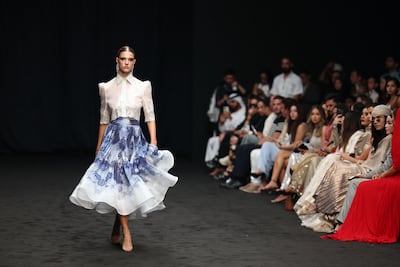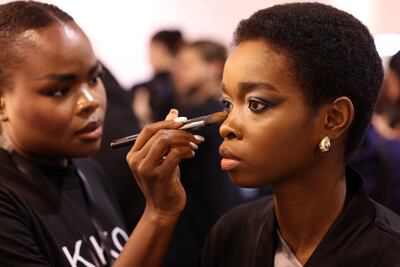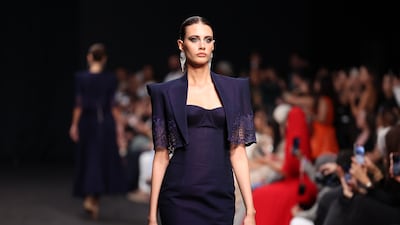Dubai Fashion Week is back. Shows from Malaysian label Rizman Ruzaini, Libyan designer Amjad Khalil, Erick Bendana from Nicaragua and Angelo Estera from the Philippines began proceedings on Sunday. Away from the runway, La Moda Italiana's showcase hosted a list of emerging names from the European country.
This eclectic mix is a true reflection of Dubai as a multicultural space, brimming with myriad nationalities, languages and cultural influences. Ultimately, through the runway lights, struts and glitter, a fashion week is a microcosm of the city it takes place in, whether that be New York, Copenhagen or Dubai.
Now an established part of the fashion calendar, Dubai Fashion Week is looking beyond the nation's borders to establish itself as a serious stakeholder on the global circuit. And what better way to do that than to reflect where it comes from?

Four cities dominate fashion: New York, London, Milan and Paris. It is around these dates in the fashion calendar that the newer entries, such as Dubai and now Riyadh, look to position themselves.
Underneath all the noise, fashion weeks are business events, where the press survey the new collections, analysing for shifts in mood or switches in temperament. Buyers, on the other hand, are searching for the best items to stock in shops, department stores and websites in six months. The buyers will have a deep understanding of their clientele and will scour the shows for the prime items that will appeal to their audience.
In this business context, New York is largely a commercial space, showcasing American brands that offer interesting but somewhat predictable collections that will appeal to a conservative audience looking for polished, classic pieces without too much fuss. Prime examples of this include Michael Kors, Carolina Herrera, Ralph Lauren and Tommy Hilfiger.

Milan too is relatively straight-laced, leaning into the upscale dressing and glamour, and showcasing homegrown talents like Dolce & Gabbana, Loro Piana and Fendi. London, meanwhile, is still regarded as the creative and slightly chaotic outlet, fed by a never-ending supply of raw talent coming from the Central Saint Martins fashion school. This establishment alone has produced Alexander McQueen, John Galliano, Phoebe Philo, Grace Wales Bonner and Riccardo Tisci. The resulting innovative, haphazard fashion is a reflection of the eclectic mix of people found on London streets.
Paris, meanwhile, is considered the spiritual home of fashion and the epitome of class and excellence. Prestigious French brands such as Christian Dior, Hermes and Louis Vuitton, all born in the city, are steeped in a precise, immaculate heritage.

The smaller fashion weeks follow a similar pattern of promoting homespun talents to a loyal and receptive audience. Sydney Fashion Week is all about dressing for its eternal summer season, while Copenhagen is home to an array of Scandinavian-cool brands and Indonesia Fashion Week, held annually in Jakarta, caters to its Muslim audience searching for fashion-led modestwear.
In this busy sphere, Dubai has been searching to carve out its own niche, under various umbrellas. An earlier attempt at a Dubai Fashion Week a decade and a half ago simply had too few brands to successfully get off the ground. Despite valiant efforts, another version, Fashion Forward Dubai, ground to a halt in 2018 for similar reasons. Arab Fashion Week and Middle East Fashion Week also followed the same path. The latest iteration of Dubai Fashion Week – a joint venture between the Arab Fashion Council and Dubai Design District – has found what seems to be the right formula and is going from strength to strength.
Dubai Fashion Week now positions itself as a regional hub, echoing the cosmopolitan nature of the city by drawing in designers from across the Middle East – from Palestine to Libya – and beyond. Just as the city proudly boasts of being a place where 180 languages are spoken, Dubai Fashion Week is a small but increasingly essential platform for designers from around the world, with this season representing countries such as the UAE, Malaysia, France, Italy, Lebanon, Russia and Spain.
As it showcases talents from around the world, it underscores the open-mindedness that has made Dubai famous, and that draws visitors and residents from around the globe. Case in point, ahead of the Rizman Ruzaini show, the designers announced plans to open a boutique in Dubai, highlighting the inclusive mentality of the city's fashion scene. And even if the feathers and the sequins of the fashion trade are not your thing, ultimately, having new ventures opening on our shores benefits everyone.

